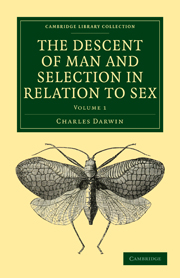Book contents
- Frontmatter
- Contents
- INTRODUCTION
- PART I ON THE DESCENT OF MAN
- CHAPTER I THE EVIDENCE OF THE DESCENT OF MAN FEOM SOME LOWER FORM
- CHAPTER II COMPARISON OF THE MENTAL POWERS OF MAN AND THE LOWER ANIMALS
- CHAPTER III COMPARISON OF THE MENTAL POWERS OF MAN AND THE LOWER ANIMAL—continued
- CHAPTER IV ON THE MANNER OF DEVELOPMENT OF MAN FROM SOME LOWER FORM
- CHAPTER V ON THE DEVELOPMENT OF THE INTELLECTUAL AND MORAL FACULTIES DURING PRIMEVAL AND CIVILISED TIMES
- CHAPTER VI ON THE AFFINITIES AND GENEALOGY OF MAN
- CHAPTER VII ON THE RACES OF MAN
- PART II SEXUAL SELECTION
CHAPTER II - COMPARISON OF THE MENTAL POWERS OF MAN AND THE LOWER ANIMALS
Published online by Cambridge University Press: 29 August 2010
- Frontmatter
- Contents
- INTRODUCTION
- PART I ON THE DESCENT OF MAN
- CHAPTER I THE EVIDENCE OF THE DESCENT OF MAN FEOM SOME LOWER FORM
- CHAPTER II COMPARISON OF THE MENTAL POWERS OF MAN AND THE LOWER ANIMALS
- CHAPTER III COMPARISON OF THE MENTAL POWERS OF MAN AND THE LOWER ANIMAL—continued
- CHAPTER IV ON THE MANNER OF DEVELOPMENT OF MAN FROM SOME LOWER FORM
- CHAPTER V ON THE DEVELOPMENT OF THE INTELLECTUAL AND MORAL FACULTIES DURING PRIMEVAL AND CIVILISED TIMES
- CHAPTER VI ON THE AFFINITIES AND GENEALOGY OF MAN
- CHAPTER VII ON THE RACES OF MAN
- PART II SEXUAL SELECTION
Summary
We have seen in the last chapter that man bears in his bodily structure clear traces of his descent from some lower form; but it may be urged that, as man differs so greatly in his mental power from all other animals, there must be some error in this conclusion. No doubt the difference in this respect is enormous, even if we compare the mind of one of the lowest savages, who has no words to express any number higher than four, and who uses no abstract terms for the commonest objects or affections, with that of the most highly organised ape. The difference would, no doubt, still remain immense, even if one of the higher apes had been improved or civilised as much as a dog has been in comparison with its parent-form, the wolf or jackal. The Fuegians rank amongst the lowest barbarians; but I was continually struck with surprise how closely the three natives on board H.M.S. “Beagle,” who had lived some years in England and could talk a little English, resembled us in disposition and in most of our mental faculties. If no organic being excepting man had possessed any mental power, or if his powers had been of a wholly different nature from those of the lower animals, then we should never have been able to convince ourselves that our high faculties had been gradually developed. But it can be clearly shewn that there is no fundamental difference of this kind.
- Type
- Chapter
- Information
- The Descent of Man and Selection in Relation to Sex , pp. 34 - 69Publisher: Cambridge University PressPrint publication year: 2009First published in: 1871



